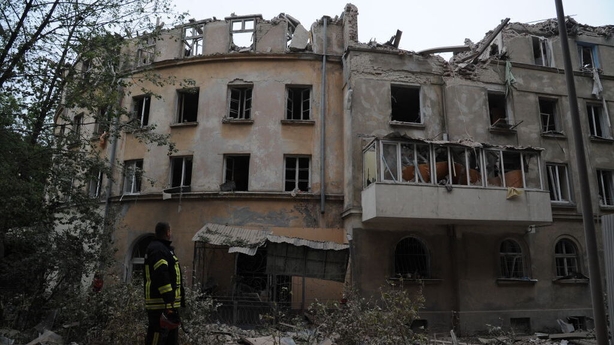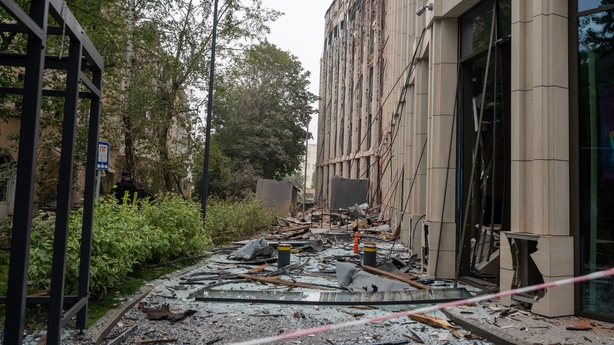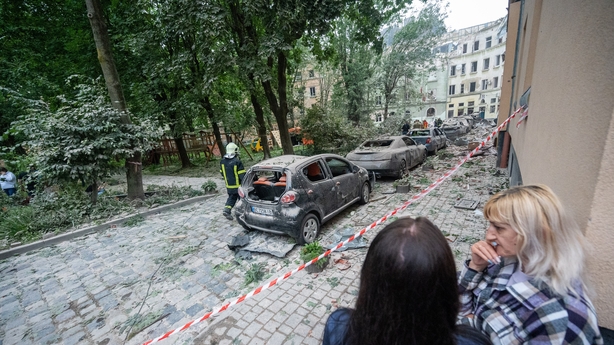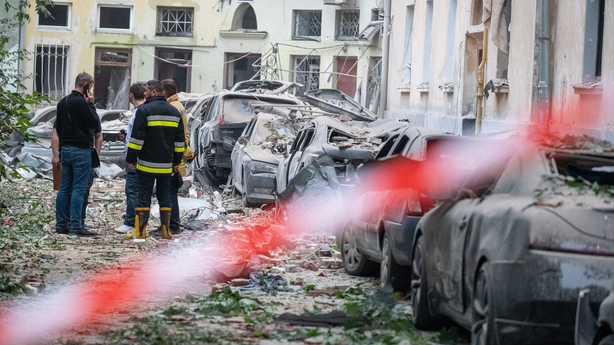Ukraine's President Volodymyr Zelensky has appealed for support in Bulgaria, a major arms maker and ally, as Kyiv pushes to join NATO.
The plea comes after the UNESCO-protected western Ukrainian city of Lviv was hit by a Russian missile early today, killing at least four people and injuring dozens more.
Lviv Mayor Andriy Sadovyi said it was the biggest attack on civilian infrastructure there since the start of the Russian invasion in February of last year.
In his one-day visit to the Bulgarian capital Sofia, Mr Zelensky held talks with Prime Minister Nikolay Denkov, as well as President Rumen Radev, other government officials and parliamentarians.
"The main focus of our talks is, of course, the security of our countries and our entire Europe, defense support and defense cooperation. The fundamental priority is energy. And strengthening our unity in Europe," the Ukrainian leader said on Telegram.
He is on his way to Prague to meet Czech counterpart Petr Pavel and other officials for "substantive negotiations" tonight and will travel to Turkey tomorrow for the first time since Russia's invasion for talks with President Recep Tayyip Erdogan.
While Mr Zelensky was in Sofia, Bulgaria and Ukraine signed a joint declaration on the Euro-Atlantic integration of the war-torn country and a memorandum of cooperation in the field of energy.
"We are grateful for the support provided by Bulgaria ... Every state has the right to defend itself, to protect its children," the president told reporters.
His visit comes as Bulgaria prepares to approve sending military aid directly to Ukraine, reversing its former practice of delivering arms to Kyiv via third countries.
Mr Zelensky told reporters that slow weapons deliveries to Ukraine delayed Kyiv's planned counteroffensive, allowing Russia to bolster its defences in occupied areas.
Russia criticised President Zelensky's visit to Bulgaria, saying he was trying to "drag" other countries into the conflict between Moscow and Kyiv.
"Many countries have already plunged headlong into this conflict, both directly and indirectly. This topic will be discussed with the Bulgarians," Kremlin spokesman Dmitry Peskov said.
Bulgaria - a European Union and NATO member but historically and culturally close to Moscow - has been deeply divided over the issue of sending arms to Kyiv.
Yet Bulgaria's munitions factories have been running at full capacity since Russia's invasion of Ukraine.
Last year, exports from Bulgaria's booming arms industry were worth an estimated €4 billion - triple the previous record set in 2017.
Until now, third countries acted as intermediaries to deliver weapons to Ukraine, a solution found at the start of the war by then-prime minister Kiril Petkov.
"Almost everything we received in the early days of the conflict came from our Bulgarian partners," Ukraine presidential adviser Mykhailo Podolyak recently said on Bulgarian television NOVA.

In Lviv, rescue workers have been sifting through rubble after the deadly Russian strike.
Ukraine's Interior Minister Igor Klymenko wrote on Telegram that the missile had struck a residential building.
"The 3rd and 4th floors in two sections of the house were destroyed," he said.
At least four people were killed in the attack and 32 wounded, including a child, the emergency services said.
"All assigned targets have been hit," the Russian defence ministry said in a statement, adding that its sea-based long-range "precision weapons" struck points of temporary deployment of Ukrainian troops and depots storing foreign-made armoured vehicles.
While Moscow regularly pounds Ukraine with missiles, artillery and drones, the Lviv region in the west, hundreds of kilometres from the frontlines and near the Polish border, has largely been spared the aerial onslaughts.

UNESCO condemned the bombing of a historic building in Lyiv and expressed "its sincere condolences" to the families of the victims.
"This attack, the first to take place in an area protected by the World Heritage Convention since the outbreak of the war on 24 February 2022, is a violation of this Convention," the UN cultural agency said.
UNESCO added that the Russian strike also violated "the 1954 Hague Convention for the Protection of Cultural Property in the Event of Armed Conflict."
It said the historic building hit by the strike was located in "the buffer zone of the World Heritage Site of 'Lviv - the Ensemble of the Historic Centre'."

Rescuers have been working to reach those still trapped, and footage showed emergency responders clearing rubble and wood from the gutted first floor of a building in Lviv.
Cars covered in dust and with their windows blown out lined a footpath piled with debris.
One elderly woman carried a cage with a bird inside away from the scene.
"I woke up from the first explosion, but we didn't have time to leave the apartment," Olya, 37, said.
"There was a second explosion, the ceiling started to fall, my mother was immediately hit," she said.
"I got to the window, started screaming, and in about half an hour the rescuers got to me, took me out and took me to the 8th hospital," Olya added.
"I came back and found out that my mother had died, my neighbours had died.
At this point, it seems that I was the only one who survived from the fourth floor. It's a miracle."

More than 50 apartments were "ruined" and a dormitory at Lviv Polytechnic University was damaged, Mayor Andriy Sadovyi posted on Telegram.
An office building had been damaged and a school building had been destroyed, he said, later announcing two official days of mourning.
President Zelensky said on social media that "Russian terrorists" were responsible for the destruction, adding: "There will definitely be a response to the enemy. A tangible one."
On 20 June, Lviv was hit by a major Russian drone assault that also targeted other cities including Kyiv.
Ukraine has recently bolstered its air defence systems with Western-supplied weapons and the number of Russian missiles and drones breaking through has diminished.
But Ukrainian air force spokesman Yuriy Ignat recently said that newly supplied systems were still insufficient to cover the whole country.

